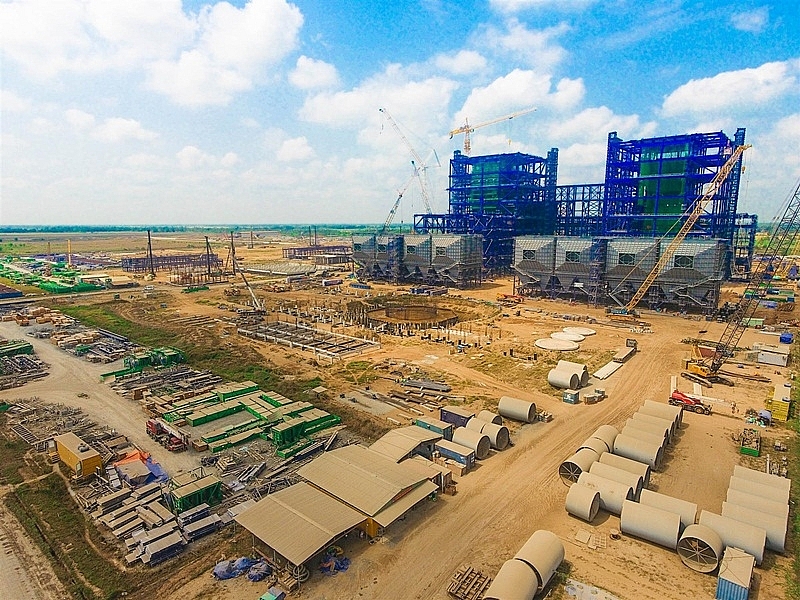US sanction on contractor delays Long Phu 1 thermal power plant
 |
| Billion-dollar Long Phu 1 thermal power plant delays for years |
PetroVietnam has sent documents to the Ministry of Industry and Trade (MoIT) to update and report about the implementation and problems at Long Phu 1 Thermal Power Plant project.
Accordingly, by September 2018, the overall progress of the engineering, procurement and construction (EPC) contracts of the joint venture between Power Machines (PM) and PetroVietnam Technical Services Corporation (PTSC) reached 77.01 per cent compared with the target 99.35 per cent.
Also, in the documents sent to the MoIT, PetroVietnam proposed to increase the investment by VND11.6 trillion ($504.35 million). Explaining the reasons, PetroVietnam cited a range of cost increases (see table).
| Construction costs | VND4.087 trillion | $177.69 million |
| Equipment costs | VND5.104 trillion | $221.91 million |
| Compensation for settlement and land clearance | VND15.24 billion | $662,608 |
| Management expenses | VND522.196 billion | $24 million |
| Construction investment consultancy | VND596.4 billion | $25.9 million |
| Provisioning expenses | VND1.260 trillion | $54.78 million |
| Other expenses | VND3.021 trillion | $131.35 million |
The project is currently running 18 months behind schedule and may be delayed by at least 36 months as the contractor Power Machines from Russia has been sanctioned by the US.
On January 26, the US Department of Treasury announced an extended list of Russian individuals and companies subject to sanctions imposed on Moscow over the Ukraine crisis, which included Power Machines (PM), the EPC contractor of Long Phu 1 thermal power plant.
The US’s embargo on PM directly impacts Long Phu 1 project. American contractors directly affected by the embargo unilaterally announced cancelling their contracts, including subcontractor General Electric (USA) which would have provided steam turbines and generators – the two most important equipment of the project.
| PetroVietnam recommended the government to direct the State Bank of Vietnam to instruct PetroVietnam in converting the payment currency of the EPC contract from USD to RUB and/or VND in case the US maintains the sanctions. |
The remaining contractors have been indirectly affected by the inability to trade in dollar, and many international banks from Italy, Germany, and Korea (except the two banks from Russia: VEB and IIB) declined to conduct payment transactions with PM.
Under the terms of the EPC contract, PM is responsible for assisting the investor in working with the bank to arrange an Export Credit Agreement (ECA) of $740 million while the rest of the EPC contract value would come from commercial loans. The amount of loans from Russian banks would include a maximum of $100 million in loans without government guarantee from International Investment Bank (IIB) and about $213.48 million from Vnesheconombank (VEB).
Since the US announced the embargo on PM, PetroVietnam and the management board of the project have immediately held meetings with the PM-PTSC joint venture, subcontractors, Russian banks, and international banks to discuss solutions to continue project implementation.
With the current difficulties, PetroVietnam asked the government to send an official dispatch requesting the Russian government, Ministry of Energy, and Ministry of Economic Development to instruct Russian banks to arrange the missing project capital. Also, Russian banks should build a payment mechanism for the EPC contract of Long Phu 1 Thermal Power Plant in USD to avoid risks and exchange costs for PetroVietnam and PM.
In addition, PetroVietnam recommended the government to direct the State Bank of Vietnam to instruct PetroVietnam in converting the payment currency of the EPC contract from USD to RUB and/or VND in case the US maintains the sanctions.
Whether the project will stick with PM or look for another contractor remains a question. Whether the solutions for the project work or not, the US embargo's bad effect on PM will still delay the construction of Long Phu 1. In addition, if the proposal to adjust the total project investment is approved, the project's selling price will increase to VND1,747.7 ($0.076) per kWh, higher than the current retail price of VND1,715.8 ($0.074) per kWh.
What the stars mean:
★ Poor ★ ★ Promising ★★★ Good ★★★★ Very good ★★★★★ Exceptional
 Tag:
Tag:
Related Contents
Latest News
More News
- VinaCapital launches Vietnam's first two strategic-beta ETFs (February 26, 2026 | 09:00)
- PM sets five key tasks to accelerate sci-tech development (February 26, 2026 | 08:00)
- PM outlines new tasks for healthcare sector (February 25, 2026 | 16:00)
- Citi report finds global trade transformed by tariffs and AI (February 25, 2026 | 10:49)
- Vietnam sets ambitious dairy growth targets (February 24, 2026 | 18:00)
- Vietnam, New Zealand seek level-up in ties (February 19, 2026 | 18:06)
- Untapped potential in relations with Indonesia (February 19, 2026 | 17:56)
- German strengths match Vietnamese aspirations (February 19, 2026 | 17:40)
- Vietnam’s pivotal year for advancing sustainability (February 19, 2026 | 08:44)
- Strengthening the core role of industry and trade (February 19, 2026 | 08:35)
























 Mobile Version
Mobile Version